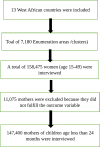Determinants of early initiation of breastfeeding following birth in West Africa: A multilevel analysis using data from multi-country national health surveys
- PMID: 38753614
- PMCID: PMC11098389
- DOI: 10.1371/journal.pone.0302143
Determinants of early initiation of breastfeeding following birth in West Africa: A multilevel analysis using data from multi-country national health surveys
Abstract
Background: Early initiation of breastfeeding (EIBF), within the first hour of birth, is crucial for promoting exclusive breastfeeding and establishing optimal nursing practices. However, global EIBF rates remain low, with even lower rates observed in Africa. Despite existing research gaps, this study aims to determine the prevalence of EIBF and identify maternal and child-related factors associated with its practice in West Africa.
Methods: This study utilized West African Demographic and Health Survey (DHS) data from 13 countries, including 146,964 children's records. To assess model fit, likelihood test and deviance were used. Similarly, intraclass correlation coefficient, median odds ratio, and proportional change in variance were employed for random effect. A multilevel logistic regression model was used to identify individual- and community-level factors influencing EIBF due to the hierarchical nature of the data. Variables with p-values ≤0.2 in the binary model and <0.05 in the final analysis were considered significantly associated with EIBF.
Results: The pooled prevalence of EIBF in West African nations was 50.60% (95% CI; 50.34-50.85%). The highest prevalence rate was observed in Serra Leone (75.33%) and the lowest prevalence was found in Senegal (33.94%). In the multilevel multiple logistic regression model, maternal education (AOR = 1.10, 95% CI, 1.03,1.16), marital status AOR = 1.07, 95% CI, 1.01,1.13), birth weight (AOR = 0.91, CI 0.86,0.96), birth orders (AOR = 1.09, CI 1.03,1.16), and (AOR = 1.11, CI 1.03,1.19), place of residence (AOR = 1.14, CI 1.07,1.21), and mode of delivery type (AOR = 0.26, CI 0.24,0.29) were significantly correlated with EIBF in West Africa.
Conclusions: The incidence of EIBF in West Africa was found to be low. The study emphasizes the need for targeted behavioral change communication programs to address timely breastfeeding initiation, specifically targeting mothers and child characteristics. Factors such as education, delivery mode, marital status, birth weight, birth order, and place of residence were significantly associated with EIBF. Special attention should be given to improving EIBF rates among women undergoing caesarean sections, infants with low birth weight, and primiparous mothers, along with structural improvements in the healthcare sector in West Africa.
Copyright: © 2024 Terefe et al. This is an open access article distributed under the terms of the Creative Commons Attribution License, which permits unrestricted use, distribution, and reproduction in any medium, provided the original author and source are credited.
Conflict of interest statement
The authors have declared that no competing interests exist.
Figures
References
-
- Organization WH. 2018 Global reference list of 100 core health indicators (plus health-related SDGs). World Health Organization, 2018.
-
- Organization WH. Early Starting of Breastfeeding: the Key to Survival and Beyond 2014.
-
- (eLENA): WHOe-LoEfNA. Early initiation of breastfeeding to promote exclusive breastfeeding: (https://www.who.int/elena/titles/early_breastfeeding/en/). 2020.



